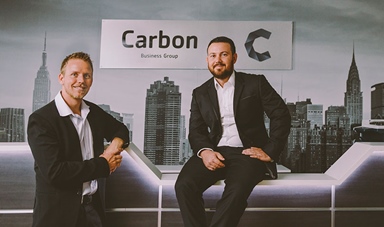Loading component...
At a glance
- Carbon Group is a major user of Xero software in its bookkeeping and accounting.
- The firm has just under 5000 clients and annual revenue of about A$12.5 million.
- Carbon Group’s business model combines not only bookkeeping and accounting, but also a full range of other in-house services.
- Founders Jamie Davison CPA and Nathan Hood CPA advocate the importance of employing people with complementary skills.
By 2023, accounting firm Carbon Group plans to have opened an office in every Australian capital city, and also in the South Island of New Zealand.
Carbon Group founders Jamie Davison CPA and Nathan Hood CPA say the New Zealand expansion is not just because the South Island is incredibly scenic and has great snowboarding on offer, although they admit that is an incentive.
“We are a major user of Xero software in our bookkeeping and accounting, and Xero dominates in New Zealand,” says Hood.
“They are also more advanced in their use of it in New Zealand, and our thinking is that if we can get in there, we can use it as a training hub and a preview of what is coming, so we can bring that back to Australia.”
The company was founded in Perth in 2014, from a merger bringing together accountant Hood and bookkeeper Davison.
From an initial headcount of 13 in the Perth office, there are now over 100 “Carbonites” – as the staff call themselves – with three offices in Western Australia, two in South Australia, two in Victoria and one in New South Wales.
The firm has just under 5000 clients, typically micro-, small and medium-sized businesses, and annual revenue of about A$12.5 million.
Hood says that from the outset, the business model was to combine not only accounting and bookkeeping in the same firm, but also to add a range of other in-house services such as mortgage broking, financial planning and general insurance services.
“Our thinking was that all of these services are intertwined and part of a client’s business journey,” he says.
“In many situations the bookkeeper is in one office, the accountant is in another and they might talk and compare notes, but it’s not in any depth, so the client gets a different spin on the same strategy and comes away confused.
“What we want is to take that all away and have a firm that talks the same story with the client, and creates a holistic strategy that combines all of these elements and helps their business grow.” Growth as an accounting firm has its challenges, however, and as Davison concedes, in the early days the partners focused too much on “replicating themselves” and not enough on finding people with complementary skills.
“Replicating ourselves was not necessarily what we needed to do,” says Davison.
“We needed to find people who were different to us, and who were better than we were at doing certain things, and we needed to bring them in and feel comfortable about that.”
With the expansion of the firm, this has become easier and now Carbon Group employs a full-time CFO and a full-time marketing manager, roles that in the early days the partners tried to cover.
Another challenge in expanding was the decision to bring staff members in as business owners, a strategy that was necessary as the firm expanded geographically and used a joint venture model when adding interstate offices.
“Our thinking was that because some staff members excelled in their roles, we thought they would excel at the next level, but we found that was a 50/50 situation,” says Hood.
“Some of our best performers in terms of culture excelled because they didn’t have the stresses of thinking about the business at the back of their minds, while for some it created a barrier for them to continue executing at the level they were at before.”
With their eyes on future growth, Hood and Davison – both in their mid-30s – are also riding the changes in the accounting profession.
Although automation and technology will reduce the compliance role for accountants, neither believe it will disappear completely. One positive from this is that while fees from compliance work may fall, they believe margins for accountants may improve.
Another change they focus on is the idea of succession, and the changing nature of accounting firms.
“A big challenge is how siloed a lot of accounting businesses are,” says Hood.
“There are a lot of sole practitioners who are in the last five years of their careers, but they have no structure around their succession plan and they don’t feel the need to invest in technology to change their systems, so we see what we call a succession and technology gap.”
When Hood and Davison look at the future of their firm, their own succession plan is to help build the skills of the younger tier of professionals under them, and move to more strategic and mentoring roles.
By that time, they plan to have opened that New Zealand office and consolidated their growth as a full-service firm in every location where they have a presence.
One piece of career advice
Don’t wait for someone to retire to have the opportunity of partnership. If the opportunity isn’t presented to you, go out and find it. Join forces with other smart operators so you can play on your strengths and have them support you with your weaknesses.

